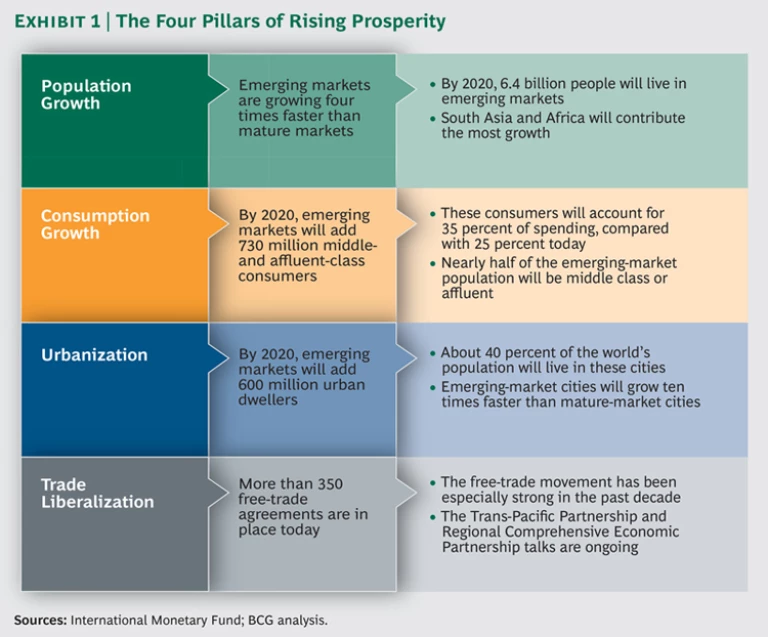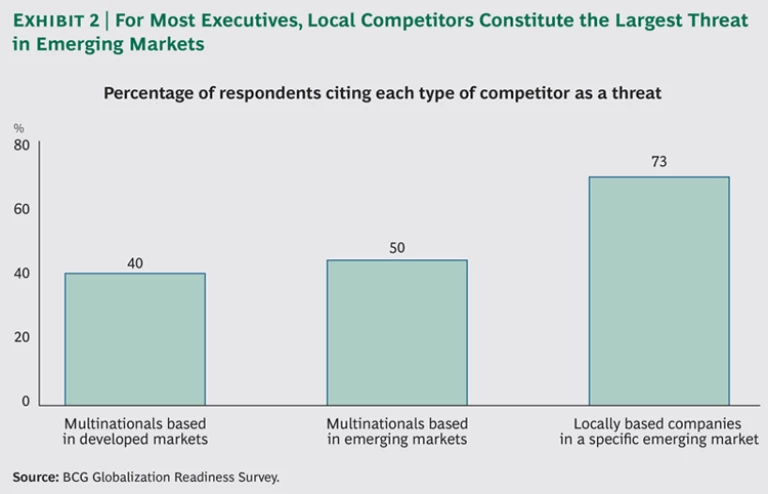Emerging markets remain global growth engines. Although some of these markets are doing better than others, they collectively offer the most promising opportunities for expansion. Yet global companies often struggle to create successful business models in emerging markets. At the same time, many local companies are thriving—building businesses that attract local customers and defeat both other homegrown companies and multinationals. Understanding the successful practices of these companies can help you win in these markets, too.
Several banks, for example, have grown quickly and profitably in emerging markets, even though most consumers frequently have unstable incomes and don't have even a checking account. In Mexico, Banco Mercantil del Norte, or Banorte, wanted to reach potential customers without constructing expensive bank branches, so it decided to rely on other companies’ bricks and mortar. The bank partnered with Telecomm-Telegrafos, a rural telecom operator with 1,621 retail locations; 7-Eleven, one of the fastest-growing convenience chains in Mexico, with 1,720 contact points; Tiendas Extra, a convenience store with 883 locations; Soriana, a supermarket chain offering 633 points of sale; and Grupo Control, with 75 points of contact as of March 2014. These partnerships aim to offer basic financial products such as deposits, credit cards, remittances, and withdrawals.
Across the Pacific Ocean, Bank Rakyat Indonesia (BRI), the nation’s oldest and most profitable bank, serves the street vendors and merchants that power the nation’s local economy. BRI sends employees equipped with handheld devices into 2,300 busy markets and bazaars, which cater to nearly 6 million customers. The bank is experimenting with floating branches to reach remote customers on Indonesia’s more than 900 inhabited islands.
In all industries, local companies are transforming the constraints of emerging economies into profitable opportunities and becoming thriving commercial enterprises. We have compiled a list of such energetic private-sector companies—or local dynamos—to highlight their accomplishments. Though there are hundreds of dynamos, we focused on just 50 to better see how their practices may be applied more broadly to all companies that want to succeed in these markets. (See Exhibit 1.)
Meet the Local Dynamos
The 2014 list reflects the consumer-driven focus of emerging markets as they increasingly start to resemble mature-market economies and move beyond low costs, cheap labor, and other traditional sources of advantage. Many of the local dynamos are competing on innovation rather than cost, for instance: South Africa’s Discovery Health, an insurance administrator, rewards its customers for modifying their lifestyles and habits.
Local dynamos have been growing faster than comparable companies in both emerging and mature economies. From 2009 to 2013, their revenues grew by 28 percent annually. This growth has generated even greater returns for shareholders. During the same period, total shareholder return rose 26 percent annually for the local dynamos, a much steeper rate than those for indices composed of similar companies.
The Secrets of Their Success
Each local dynamo has its own story about how it has won in its home market. At the same time, the 50 companies share six traits that give them an edge. Four of these traits are specific to the business models that they deploy to thrive in emerging markets: catering to customers and local conditions, leveraging digital technologies, operating at warp speed, and adapting to uncertainty and circumstance.
The other two traits—building talent engines and establishing functional excellence—demonstrate the rapid development of these companies as they create world-class strengths and gain skills commonly found in multinational companies. (See Exhibit 2.)
Let’s see how they do it. Catering to Customers and Local Conditions. The local dynamos understand their customers intimately and know how to appeal to them. They identify new customer segments, unmet needs, and local habits that other companies do not recognize. Perhaps foremost, they understand the cost-and-quality calculus that will appeal to the growing middle and affluent class in these markets.
Shriram Transport Finance, for example, was founded in India in 1979 to provide financing to owners of small trucks, a segment that financial institutions were largely ignoring. Shriram now boasts more than 600 branches and about a 25 percent share of the preowned commercial-vehicle financing market in India. Field officers make monthly visits to borrowers, during which they often collect cash payments.
Leveraging Digital Technologies. By 2018, there will be an additional The 2013 TMT Value Creators Report: The Great Software Transformation and more than 5 billion post-PC products—tablets and smartphones—in circulation than there are today. Most will be located in emerging markets.
Although Internet and mobile coverage remains spotty in these markets, innovation is sky high. Without investments in hard infrastructure (such as stores and branches) to protect, many companies are focusing their resources on online and mobile channels.
Xiaomi, for example, forgoes expensive retail outlets and sells mobile phones directly to consumers in China. In 2013, the company sold about 18.7 million smartphones at about half the price of comparable Samsung and Apple phones; Xiaomi already outsells Apple in China. CEO and founder Lei Jun has ambitions to sell 60 million smartphones in 2014. Xiaomi offers batches of 200,000 to 300,000 phones at a time, and they sometimes sell out in minutes.
Xiaomi is also mastering online marketing platforms. Its social-media team is active on WeChat, Baidu, QQ, and other online forums. Lei Jun has 8 million followers on Sina Weibo, currently the most popular social-media platform in China.
Operating at Warp Speed. Local dynamos have built their businesses swiftly and successfully. They add people in large numbers without faltering. They move into new segments and rapidly become market leaders. In markets comprising multiple regions and customer segments, many of the dynamos have created national brands and established a national sales and retail presence.
Brazil’s Magazine Luiza, a retailer with $4.1 billion in sales in 2013, has grown more than 26 percent annually since 2009 by catering to Brazil’s swelling middle class. As a result of several acquisitions, Magazine Luiza has more than tripled the number of its stores over the past ten years. But the company has also grown organically, expanding in important cities such as São Paulo, where it opened 44 stores in a single day in 2008.
Online sales have been growing faster than conventional sales, thanks to innovations such as social-shopping services and strong fulfillment. The company has, for example, created online stores on Facebook and elsewhere that allow consumers to sell goods on commission to friends and family.
Adapting to Uncertainty and Circumstance. Still, the emerging-market environment remains challenging. The supply of electrical service is sometimes uneven. Roads and rail networks, high-speed wireless networks, and ports are works in progress in many locations. Market intelligence is occasionally spotty. But local dynamos have creatively worked through these limitations to meet the needs of their customers.
Equity Bank, one of the largest banks in Kenya, has expanded by providing services to customers previously viewed as “unbankable.” Rather than build local branches for people who live in remote areas, Equity Bank relies on agents to deliver financial services. The agents use their smartphones to accept an application for a new account. The application is then processed centrally, and the applicant receives notification of the status of the application via text messages.
Building Talent Engines. Talent shortages may be acute everywhere, but they are especially severe in emerging markets. Historically, companies have not offered the same level of training and development that schools provide, and schools just can’t keep up with the demand for qualified candidates. Job-hopping is often viewed as the fastest way to advance rapidly in these markets.
Local dynamos successfully overcome these constraints. They hire top local talent and build an engaging and rewarding environment. They also put in place strong people practices so they can identify, train, and promote their best employees and help those who need stronger skills.
HaiDiLao Hotpot, a thriving hot-pot restaurant chain in China, provides a captivating customer experience that would be impossible to pull off without engaged employees. “On special holidays, magicians in colorful, traditional masks perform tricks. Patrons order using iPads. Periodically, a server breaks into the restaurant’s signature Olympic-style ‘noodle dance,’” a Wall Street Journal article observed in 2013.
The company has promoted this environment through careful development and training of its employees. Performance evaluations, for example, are based on customer satisfaction and an employee’s passion for work. And HaiDiLao’s benefits are unmatched in the restaurant industry: the company offers free apartments, with air conditioning and Internet, to employees and helps them solve any difficulties with enrolling their children in school.
Establishing Functional Excellence. One of the ways that many local dynamos distinguish themselves from the rest of the pack is by developing functional capabilities that rival—or even exceed—those of multinational companies. These capabilities include business model innovation, technological innovation, operational excellence, branding and marketing, product offering, and customer service.
Cinépolis excels in many of these areas. The company has grown to become the largest movie operator in Mexico, with 295 cinemas and 136.7 million annual visitors, by offering an unparalleled and innovative theatrical experience. Its theaters have comfortable stadium seating and modern digital technologies.
Heeding the results of market research, Cinépolis developed movie snacks with Mexican flavors, such as popcorn with lemon juice and chili sauce. Customers can enjoy a meal while watching a movie in the VIP room. Some of the theaters are equipped with “4DX” technology, which produces movement, smells, mist, and wind in addition to sound and video. Cinépolis has also developed facilities where children can watch movies while playing in a ball pit.
Shaping Your Response to the Local Dynamos
How can you compete against these homegrown companies? You need both to emulate them and emphasize your own strengths.
Emulating the dynamos will require you to operate with their energy, ambition, and entrepreneurial zeal and to adopt the characteristics that we identified earlier as keys to their success in their home markets. Ask yourself the following questions:
- Are your best and brightest employees deployed in emerging markets? If not, you will lose.
- Are your aspirations bold enough? Unless your aim is to grow twice as fast as the market, your aspirations are too low.
- Have you created a profitable business model that delivers growth now? You need to deliver something special and specific to each market at an affordable, yet profitable, price.
- Do you and your senior team spend enough time on the ground? You need to be more than a tourist to succeed against these home-grown companies. You and your team should walk the streets, take public transportation, and visit stores, homes, hospitals, and government offices.
- Are your initial investments big enough? Money does not buy success in these markets, but it can help to overcome the running start that local dynamos have. You simply cannot make up the lost ground with incremental investments.
Emphasizing your own strengths should be an easier task. You do not have to abandon what worked at home or in other overseas markets. But you do have to figure out how to apply your scale, expertise, brand, R&D capabilities, access to capital—and whatever other strengths you possess—in a different and potentially rewarding setting.






